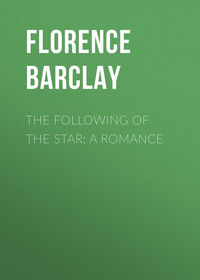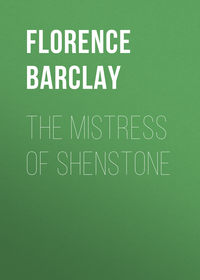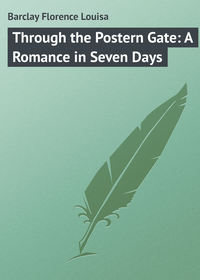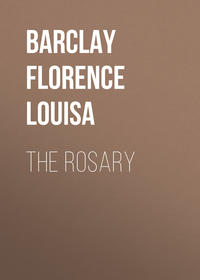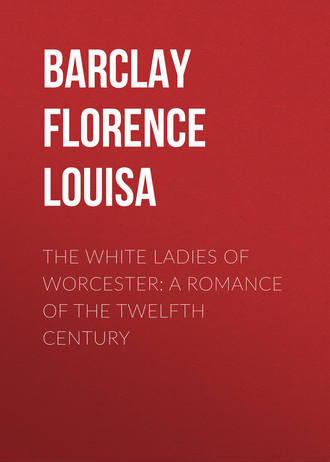 полная версия
полная версияThe White Ladies of Worcester: A Romance of the Twelfth Century
"My Lord High Cardinal, I congratulate you! That a cardinal's hat should tempt you from your cathedral, from this noble English city, from your people who love you, from the land of your birth, may perhaps be understood. But that, for the sake of Church preferment, however high, you should willingly depart, leaving Mora in sorrow, Mora in difficulty, Mora needing your help–"
The Knight paused, amazed. The Bishop, who seldom laughed aloud, was laughing. Yet no! The Bishop, who never wept, seemed near to weeping.
The scales fell from Hugh's eyes, even before the Bishop spoke. He realised a love as great as his own.
"Ah, foolish lad!" said Symon of Worcester; "bent upon thine own ways, and easy to deceive. When I spoke of going, I said it for her sake, hoping the prospect of my absence might hold you from your purpose. But now truly am I convinced that you are bent upon risking your own happiness, and imperilling hers. Therefore will I devise some means of detaining the Holy Father's messenger, so that my answer need not be given until two weeks are past. You will reach Mora, at longest, five days from this. As soon as she decides what she will do, send word to me by a fast messenger. Should she elect to return to the Nunnery, state when and where, upon the road, I am to meet her. Her habit as Prioress, and her cross of office, I have here. The former you returned to me, from the hostel; the latter I found in her cell. You must take them with you. If she returns, she must return fully robed. If, on the other hand, she should decide to remain with you; if—as may God grant—she is content, and requires no help from me, send me this news by messenger. I can then betake myself to that fair land to which I first went for her sake; left for her sake, and to which I shall most gladly return, if her need of me is over. The time I state allows a four days' margin for vacillation."
"My lord," said the Knight, humbly, "forgive the wrong I did you. Forgive that I took in earnest that which you meant in jest; or rather, I do truly think, that which you hoped would turn me from my purpose. Alas, I would indeed that I might rightly be turned therefrom."
"Hugh," said the Bishop, eagerly, "you deemed her justified in coming to you, apart from any vision."
"True," replied the Knight, "but I cannot feel justified in taking her, and all she would give me, knowing she gives it, with a free heart, because of her faith in the vision. Moments of purest joy would be clouded by my secret shame. Being aware of the deception, I too should be deceiving her; I, whom she loves and trusts."
"To withhold a truth is not to lie," asserted the Bishop.
"My lord," replied Hugh d'Argent, rising to his feet and standing erect, his hand upon his sword, "I cannot reason of these things; I cannot define the difference between withholding a truth and stating a lie. But when mine Honour sounds a challenge, I hear; and I ride out to do battle—against myself, if need be; or, if it must so be, against another. On Eastern battle-fields, in Holy War, I won a name known throughout all the camp, known also to the enemy: 'The Knight of the Silver Shield.' Our name is Argent, and we ever have the right to carry a pure silver shield. But I won the name because my shield was always bright; because not once in battle did it fall in the dust; because it never was allowed to tarnish. So bright it was, that as I rode, bearing it before me, reflecting the rays of the sun, it dazzled and blinded the enemy. My lord, I cannot tarnish my silver shield by conniving at falsehood, or keeping silence when mine Honour bids me speak."
Looking at the gallant figure before him, the Bishop's soul responded to the noble words, and he longed to praise them and applaud. But he thought of Mora's peace of mind, Mora's awakened heart and dawning happiness. For her sake he must make a final stand.
"My dear Hugh," he said, "all this talk, of a silver shield and of the challenge of honour, is well enough for the warrior on the battle-field. But the lover has to learn the harder lesson; he has to give up Self, even the Self which holds honour dear. When you polished your silver shield, keeping it so bright, what saw you reflected therein? Why, your own proud face. Even so, now, you fear the faintest tarnish on your sense of honour, but you will keep that silver shield bright at Mora's expense, riding on proudly alone in your glory, reflecting the sun, dazzling all beholders, while your wife who loved and trusted you, Mora, who told you the sweet wonder of her love in words of deepest tenderness, lies desolate in the dark, with a shattered life, and a broken heart. Hugh, I would have you think of the treasure of her golden heart, rather than of the brightness of your own selfish, silver shield."
"Selfish!" cried the Knight. "Selfish! Is it selfish to hold honour dear? Is it selfish to be ashamed to deceive the woman one loves? Have I, who have so striven in all things to put her welfare first, been selfish towards my wife in this hour of crisis?"
He sat down, heavily; leaned his elbows on his knees, and dropped his head into his hands.
This attitude of utter dejection filled the Bishop with thankfulness. Was he, in the very moment when he had given up all hope of winning, about to prove the victor?
"Perilously selfish, my dear Hugh," he said. "But, thank Heaven, no harm has yet been done. Listen to me and I will shew you how you may keep your honour safely untarnished, yet withhold from Mora all knowledge which might cause her disquietude of mind, thus securing her happiness and your own."
CHAPTER LI
TWO NOBLE HEARTS GO DIFFERENT WAYS
On that same afternoon, an hour before sunset, the two men who loved Mora faced one another, for a final farewell.
The Bishop had said all he had to say. Without interruption, his words had flowed steadily on; eloquent, logical, conciliatory, persuasive.
At first he had talked to the top of the Knight's head, to the clenched hands, to the arms outstretched across the table.
He had wondered what thoughts were at work beneath the crisp thickness of that dark hair. He had wished the rigid attitude of tense despair might somewhat relax. He had used the most telling inflexions of his persuasive voice in order to bring this about, but without success. He had wished the Knight would break silence, even to rage or to disagree. To that end he had cast as a bait an intentional slip in a statement of facts; and, later on, a palpable false deduction in a weighty argument. But the Knight had not risen to either.
After a while Hugh had lifted his head, and leaned back in his chair; fixing his eyes, in his turn, upon the banner hanging from the rafters.
It had ceased to wave gently to and fro. Probably Father Benedict had closed the trap-door, concealed behind an upright beam, through which he was wont to peer down into the banqueting hall below, in order to satisfy himself that all was well and that the Reverend Father needed naught.
Let it be here recorded that this exceeding vigilance, on the part of Father Benedict, met with but scant reward. For, having deduced a draught, and its reason, from the slight stirring of the banner during his conversation with the Knight, the Bishop gave certain secret instructions to Brother Philip, with the result that the next time the Chaplain peered down upon a private conference he found, at its close, the door by which he had gained access to the roof chamber barred on the outside, and, forcing it, he was in no better case, the ladder which connected it with another disused chamber below having been removed. Thereafter Father Benedict watched the Bishop, and his guest, partake of three meals, before he could bring himself to make known his predicament, and beg to be released. And, even then, the Bishop was amazingly slow in locating the place from which issued the agitated voice imploring assistance. Several brethren were summoned to help; so that quite a little crowd stood gazing up at the pallid countenance of Father Benedict, framed in the trap-door as, lying upon his very empty stomach, he called down replies to the Bishop's questions; vainly striving to give a plausible reason for the peculiar situation in which he was discovered.
But, to return to the interview which brought about this later development.
The Knight had lifted his head, yet had still remained silent and impassive.
Where at length the Bishop had paused, awaiting comment of some kind, Hugh d'Argent, removing his eyes from the rafters, had asked:
"When, my lord, do you propose to meet the Prioress, should my wife, upon learning the truth, elect to return to the Nunnery?"
Thus had the Bishop been forced to realise that the flow of his eloquence, the ripple of his humour, the strong current of his arguments, the gentle lapping of his tenderness, the breakers of his threats, and the thunderous billows of his denunciations, had alike expended themselves against the rock of the Knight's unshakable resolve, and left it standing.
Whereupon, in silence, the Bishop had risen, and had led the way to the library.
Here they now faced one another in final farewell.
Each knew that his loss would be the other's gain; his gain, the other's irreparable loss.
Yet, at that moment, each thought only of Mora's peace of soul. They did but differ in their conception of the way in which that peace might best be preserved and maintained.
"I must take her cross of office, my Lord Bishop," said the Knight, with decision.
The Bishop went to a chest, standing in one corner of the room, opened it, and bent over it, his back to Hugh d'Argent; then, slipping his hand into his bosom drew therefrom a cross of gold gleaming with emeralds. Shutting down the massive lid of the chest, he returned, and placed the cross in the outstretched hand of the Knight.
"I entrust it to you, my dear Hugh, only on one condition: that it shall without fail return to me in two weeks' time. Should you decide to tell your wife the true history of the vision, I must see this cross of office upon her breast when I meet her riding back to Worcester, once more Prioress of the White Ladies. If, on the other hand, wiser counsel prevails, and you decide not to tell her, you must, by swift messenger, at once return it to me in a sealed packet."
"I shall tell her," said the Knight. "If she elects to leave me, you will see the cross upon her breast, my lord. If she elects to stay, you shall receive it by swift messenger."
"She will leave you," said the Bishop. "If you tell her, she will leave you."
"She loves me," said the Knight; and he said it with a tender reverence, and such a look upon his face, as a man wears when he speaks of his faith in God.
"Hugh," said the Bishop, sadly; "Hugh, my dear lad, you have but little experience of the heart of a nun. The more she loves, the more determined will she be to leave you, if you yourself give her reason to think her love unjustified. The very thing which is now a cause of bliss will instantly become a cause for fear. She will flee from joy, as all pure hearts flee from sin; because, owing to your folly, her joy will seem to her to be sinful. My son!"—the Bishop stretched out his hands; a passion of appeal was in his voice—"God and Holy Church have given you your wife. If you tell her this thing, you will lose her."
"I must take with me the dress she left behind," said the Knight, "so that, should she decide to go, she may ride back fully robed."
The Bishop went again to the chest, raised the heavy lid, and lifted out the white garments rolled together. At sight of them both men fell silent, as in presence of the dead; and the Knight felt his heart grow cold with apprehension, as he received them from the Bishop's hand.
They passed together through the doorway leading to the river terrace, and so down the lawn, under the arch, and into the courtyard.
There Brother Philip waited, mounted, while another lay-brother held the Knight's horse.
As they came in sight of the horses: "Philip will see you a few miles on your way," said the Bishop.
"I thank you, Father," replied the Knight, "but it is not needful. The good Brother has had many long days in the saddle."
"It is most needful," said the Bishop. "Let Philip ride beside you until you have passed through the Monk's Wood, and are well on to the open ground beyond. There, if you will, you may bid him turn back."
"Is this to ensure the safety of the Worcester cut-throats, my lord?"
The Bishop smiled.
"Possibly," he said. "Saracens may be hewn in pieces, with impunity. But we cannot allow our Worcester lads rashly to ride to such a fate. Also, my dear Hugh, you carry things of so great value that we must not risk a scuffle. These are troublous times, and dangers lurk around the city. Three miles from here you may dismiss Brother Philip, and ride forward alone."
Arrived at the horses, the Knight put away safely, that which he carried, into his saddle-bag. Then he dropped on one knee, baring his head for the Bishop's blessing.
Symon of Worcester gave it. Then, bending, added in low tones: "And may God and the blessèd Saints aid thee to a right judgment in all things."
"Amen," said Hugh d'Argent, and kissed the Bishop's ring.
Then he mounted; and, without one backward look, rode out through the Palace gates, closely followed by Brother Philip.
CHAPTER LII
THE ANGEL-CHILD
Symon of Worcester turned, walked slowly across the courtyard, made his way to the parapet above the river, and stood long, with bent head, watching the rapid flow of the Severn.
His eyes rested upon the very place where the Knight had cleft the water in his impulsive dive after the white stone, made, by the Bishop's own words, to stand to him for his chances of winning the Prioress.
Yet should that sudden leap be described as "impulsive"? The Bishop, ever a stickler for accuracy in descriptive words, considered this.
Nay, not so much "impulsive" as "prompt." Even as the warrior who, having tested his trusty sword, knowing its readiness in the scabbard and the strength of his own right arm, draws, on the instant, when surprised by the enemy. Prompt, not impulsive. A swift action, based upon an assured certainty of power, and a steadfast determination, of long standing, to win at all costs.
The Bishop's hand rested upon the parapet. The stone in his ring held neither blue nor purple lights. Its colour had paled and faded. It shone—as the Prioress had once seen it shine—like a large tear-drop on the Bishop's finger.
Deep dejection was in the Bishop's attitude. With the riding away of the Knight, something strong and vital seemed to have passed out of his life.
A sense of failure oppressed him. He had not succeeded in bending Hugh d'Argent to his will, neither had he risen to a frank appreciation of the loyal chivalry which would not enjoy happiness at the expense of honour.
While his mind refused to accept the Knight's code, his soul yearned to rise up and acclaim it.
Yet, working to the last for Mora's peace of mind, he had maintained his tone of scornful disapproval.
He would never again have the chance to cry "Hail!" to the Silver Shield. The deft fingers of his sophistry had striven to loosen the Knight's shining armour. How far they had succeeded, the Bishop could not tell. But, as he watched the swiftly moving river, he found himself wishing that his task had been to strengthen, rather than to weaken; to gird up and brace, rather than subtly to unbuckle and disarm. Yet by so doing, would he not have been ensuring his own happiness, bringing back the joy of life to his own heart, at the expense of the two whom he had given to be each other's in the Name of the Divine Trinity?
If Hugh persisted in his folly, he would lose his bride, yet would the Bishop meet and reinstate the Prioress with a clear conscience, having striven to the very last to dissuade the Knight.
If, on the other hand, Hugh, growing wiser as he rode northward, decided to keep silence, why then the sunny land he loved, and the Cardinal's office, for Symon, Bishop of Worcester.
But meanwhile, two weeks of uncertainty; and the Bishop could not abide uncertainty.
He turned from the river and began to pace the lawn slowly from end to end, his head bent, his hands clasped behind him.
Each time he reached the wall between the garden and the courtyard, he found himself confronted by two rose trees, a red and a white, climbing so near together that their branches intertwined, crimson blooms resting their rich petals against the fragrant fairness of their white neighbours.
Presently these roses became symbolic to the Bishop—the white, of the fair presence of the Prioress; the red, of the high honour awaiting him in Rome.
He was seized by the whimsical idea that, were he to close his eyes, beseech the blessèd Saint Joseph to guide his hand, take three steps forward, and pluck the first blossom his fingers touched, he might put an end to this tiresome uncertainty.
But he smiled at the childishness of the fancy. It savoured of the old lay-sister, Mary Antony, playing with her peas and confiding in her robin. Moreover the Bishop never did anything with his eyes shut. He would have slept with them open, had not Nature decreed otherwise.
Once again he paced the full length of the lawn, his hands clasped behind his back, his eyes looking beyond the river to the distant hills.
"Will she come, or shall I go? Shall I depart, or will she return?"
As he turned at the parapet, a voice seemed to whisper with insistence:
"A white rose for her pure presence in the Cloister. A red rose for Rome."
And, as he reached the wall again, the bright eyes of a little maiden peeped at him through the archway.
He stood quite still and looked at her.
Never had he seen so lovely an elf. A sunbeam had made its home in each lock of her tumbled hair. Her little brown face had the soft bloom of a ripe nectarine; her eyes, the timid glance of a startled fawn.
The Bishop smiled.
The bright eyes lost their look of fear, and sparkled responsive.
The Bishop beckoned.
The little maid stole through the archway; then, gaining courage flew over the turf, and stood between the Bishop and the roses.
"How camest thou here, my little one?" questioned Symon of Worcester, in his softest tones.
"The big gate stood open, sir, and I ran in."
"And what is thy name, my little maid?"
"Verity," whispered the child, shyly, blushing to speak her own name.
"Ah," murmured the Bishop. "Hath Truth indeed come in at my open gate?"
Then, smiling into the little face lifted so confidingly to his: "Dost thou want something, Angel-child, that I can give thee?"
One little bare, brown foot rubbed itself nervously over the other.
Five little brown, bare toes wriggled themselves into the grass.
"Be not afraid," said the Bishop. "Ask what thou wilt and I will give it thee, unto the half of my kingdom. Yea, even the head of Father Benedict, in a charger."
"A rose," said the child, eagerly ignoring the proffered head of Father Benedict and half the Bishop's kingdom. "A rose from that lovely tree!
Their pretty faces looked at me over the wall."
The Bishop's lips still smiled; but his eyes, of a sudden, grew grave.
"Blessèd Saint Joseph!" he murmured beneath his breath, and crossed himself.
Then, bending over the little maid, he laid his hand upon the tumbled curls.
"Truly, my little Verity," he said, "thou shalt gather thyself a rose, and thou shall gather one for me. I leave thee free to make thy choice. See! I clasp my hands behind me—thus. Then I shall turn and walk slowly up the lawn. So soon as my back is turned, pluck thou two roses. Fly with those little brown feet after me, and place one of the roses—whichever thou wilt—in my hands. Then run home thyself, with the other. Farewell, little Angel-child. May the blessing of Bethlehem's purple hills be ever thine."
The Bishop turned and paced slowly up the lawn, head bent, hands clasped behind him.
The small bare feet made no sound on the turf. But before the Bishop was half-way across the lawn, the stem of a rose was thrust between his fingers. As they closed over it, a gay ripple of laughter sounded behind him, fading fleetly into the distance.
The Angel-child had made her choice, and had flown with her own rose, leaving the Bishop's destiny in his clasped hands.
Without pausing or looking round, he paced onward, gazing for a while at the sparkling water; then beyond it, to the distant woods through which the Knight was riding.
Presently he turned, still with his hands behind him, passed to the garden-door, left standing wide, and entered the library.
But not until he kneeled before the shrine of Saint Joseph did he move forward his right hand, and bring into view the rose placed therein by Verity.
It was many years since the Bishop had wept. He had not thought ever to weep again. Yet, at sight of the rose, plucked for him by the Angel-child, something gave way within him, and he fell to weeping helplessly.
Saint Joseph, bearded and stalwart, seemed to look down with compassion upon the bowed head with its abundant silvery hair.
Even thus, it may be, had he himself wept when, after his time of hard mental torture, the Angel of the Lord appeared unto him, saying: "Fear not."
After a while the Bishop left the shrine, went over to the deed chest, and laid the rose beside the white stone.
"There, my dear Hugh," he murmured; "thy stone, and my rose. Truly they look well together. Each represents the triumph of firm resolve. Yet mine will shortly fade and pass away; while thine, dear lad, will abide forever."
The Bishop seated himself at his table, and sounded the silver gong.
A lay-brother appeared.
"Benedicite," said the Bishop. "Request Fra Andrea Filippo at once to come hither. I must have speech with him, without delay."
CHAPTER LIII
ON THE HOLY MOUNT
On the ninth day since Hugh's departure, the day when fast riding might make his return possible before nightfall, Mora rose early.
At the hour when she had been wont to ring the Convent bell, she was walking swiftly over the moors and climbing the heather-clad hills.
She had remembered a little chapel, high up in the mountains, where dwelt a holy Hermit, held in high repute for his saintliness of life, his wisdom in the giving of spiritual counsel, and his skill in ministering to the sick.
It had come to Mora, as she prayed and pondered during the night, that if she could make full confession to this holy man, he might be able to throw some clear beam of light upon the dark tangle of her perplexity.
This hope was strongly with her as she walked.
"Lighten my darkness! Lead me in a plain path!" was the cry of her bewildered soul.
It seemed to her that she had two issues to consider. First: the question as to whether Hugh, guided by the Bishop, would keep silence; thus making himself a party to her deception. Secondly: the position in which she was placed by the fact that she had left the Convent, owing to that deception. But, for the moment the first issue was so infinitely the greater, that she found herself thrusting the second into the background, allowing herself to be conscious of it merely as a question to be faced later on, when the all-important point of Hugh's attitude in the matter should be settled.
She walked forward swiftly, one idea alone possessing her: that she hastened toward possible help.
She did not slacken speed until the chapel came into view, its grey walls glistening in the morning light, a clump of feathery rowan trees beside it; at its back a mighty rock, flung down in bygone centuries from the mountain which towered behind it. From a deep cleft in this rock sprang a young oak, dipping its fresh green to the roof of the chapel; all around it, in every crack and cranny, parsley fern, hare-bells on delicate, swaying stalks, foxgloves tall and straight, and glorious bunches of purpling heather.
Nearby was the humble dwelling of the Hermit. The door stood ajar.
Softly approaching, Mora lifted her hand, and knocked.
No voice replied.
The sound of her knock did but make evident the presence of a vast solitude.
Pushing open the door, she ventured to look within.


